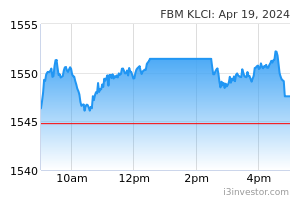Dr M: Malaysia Inc concept more important than ever

LANGKAWI: Prime Minister Tun Dr Mahathir Mohamad said the concept of Malaysia Incorporated (Malaysia Inc), which integrates the private and public sectors into one common objective, is now more important than ever to achieve the country’s big and ambitious goals.
In his speech at the launch of 5G (fifth-generation) demonstration projects here last night, Dr Mahathir said the concept introduced by him during his first stint as the prime minister still applies to this day.
“Because of such collaboration, I am pleased to see that through the 5G demonstration projects, we have identified 100 use cases, of which today we have 72 5G use cases in 56 live 5G sites across six states that include Kedah, Kuala Lumpur Federal Territory, Perak, Selangor, Terengganu and Penang,” he said.
Dr Mahathir said in this fast-paced and high-octane world, the country needs to be agile as change is a daily constant.
“If we remain stagnant, we will not be able to compete in the global economy,” he added.
The prime minister said since he launched the “5G Malaysia Showcase” in April 2019, preparations to deploy 5G had been progressing well and set for commercial rollout in the third quarter of 2020.
“This marks a significant beginning in our nation’s journey towards strengthening our economy to achieve sustainable growth and share the prosperity we gain with our people and ensure that we achieve our target of providing every single citizen in this nation a decent standard of living by 2030,” he said.
Dr Mahathir added that Malaysia risks being left behind if the country does not change as well.
“From the rise of smartphones in 2007 that changed the way we live, to the growth of shale oil in 2014 that triggered one of the largest oil price shocks in history, and to the mighty rise of numerous technology brands like Google, Apple, Facebook, Amazon, Netflix, and Huawei.
“The common denominator was technology,” he elaborated
Hence, he said the convergence of 5G and different industrial sectors such as agriculture, education, healthcare, manufacturing, smart transportation and tourism, presented new opportunities for industries, society, and individuals to advance their digital ambition and deliver new and better services.
In developing countries, manufacturing continues to be the avenue from subsistence agriculture to rising incomes and living standards.
Similarly, the manufacturing sector had played a key role in turning Malaysia into a major player in the global value chain, he said.
For the past five years, the manufacturing industry has contributed 22% to the country’s gross domestic product.
“Therefore, as the Fourth Industrial Revolution engulfs us, the question we must ask ourselves is — are we ready for it? How do we leverage this transformative technology to enhance productivity and growth?” he asked.
Dr Mahathir said countries like China, the US and South Korea are already rolling out 5G that will not only provide better experiences for existing applications but also accelerate use cases such as autonomous cars and remote surgeries that were not possible with previous generations of mobile networks.
Citing data by Euromonitor International, he said by 2023, the total sales of Internet retailing in Malaysia would surge to RM30.03 billion. Out of this, RM18 billion will be purchases made through smartphones. This is about three times more than the projected Internet sales of RM11.41 billion in 2019.
“Businesses must, however, ensure that technology is able to complement the workforce to become more effective, knowledgeable, and productive. Technology that displaces humans runs contrary to the aspiration of the country as outlined in the government’s Shared Prosperity Vision 2030,” he said. —Bernama
( 24,36 % )
( 39,38 % )
( 36,26 % )


